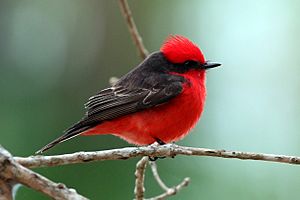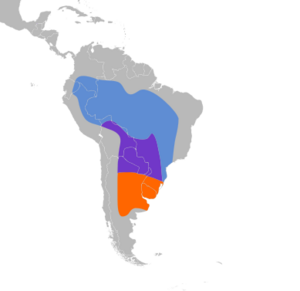Scarlet flycatcher facts for kids
Quick facts for kids Scarlet flycatcher |
|
|---|---|
 |
|
| in the Pantanal, Brazil | |
| Conservation status | |
| Scientific classification |
|
| Kingdom: | Animalia |
| Phylum: | Chordata |
| Class: | Aves |
| Order: | Passeriformes |
| Family: | Tyrannidae |
| Genus: | Pyrocephalus |
| Species: |
P. rubinus
|
| Binomial name | |
| Pyrocephalus rubinus (Boddaert, 1783)
|
|
 |
|
| Script error: The function "autoWithCaption" does not exist. | |
Script error: No such module "Check for conflicting parameters".
The scarlet flycatcher is a small, colorful bird. It is also known as the austral vermilion flycatcher. Its scientific name is Pyrocephalus rubinus. This bird is famous for its bright red feathers, especially on the male birds.
You can find the scarlet flycatcher in parts of South America. It lives in southeastern Bolivia and Brazil, Paraguay, Argentina, and Uruguay.
Scientists sometimes debate if it is its own species or a type of vermilion flycatcher. However, many groups, like the International Ornithologists' Union, now recognize it as a separate species.
How Scientists Name Birds
Scientists give every living thing a special two-part name. This helps everyone know exactly which plant or animal they are talking about. This system is called binomial nomenclature.
The scarlet flycatcher was first described in 1779 by a French scientist named Georges-Louis Leclerc, Comte de Buffon. Later, in 1783, another scientist, Pieter Boddaert, gave it the scientific name Muscicapa rubinus.
Today, the scarlet flycatcher is placed in a group, or genus, called Pyrocephalus. This group name was created in 1839 by an English bird expert, John Gould. The name Pyrocephalus comes from ancient Greek words. Purrhos means "flame-coloured" or "red," and -kephalos means "-headed." The second part of its name, rubinus, is a Medieval Latin word meaning "ruby-coloured." Both parts of the name describe its bright red color!
For a long time, scientists thought the scarlet flycatcher was the same species as the vermilion flycatcher. But in 2016, a new study looked closely at their DNA. This study showed that they are actually different species.
What They Look Like
The scarlet flycatcher looks very much like the vermilion flycatcher. However, there are a few ways to tell them apart. Scarlet flycatchers have slightly pointier wings. Their songs are also quite different.
These birds generally live in different areas. Their breeding times usually do not overlap either. This helps them stay separate species.
 | Madam C. J. Walker |
 | Janet Emerson Bashen |
 | Annie Turnbo Malone |
 | Maggie L. Walker |


